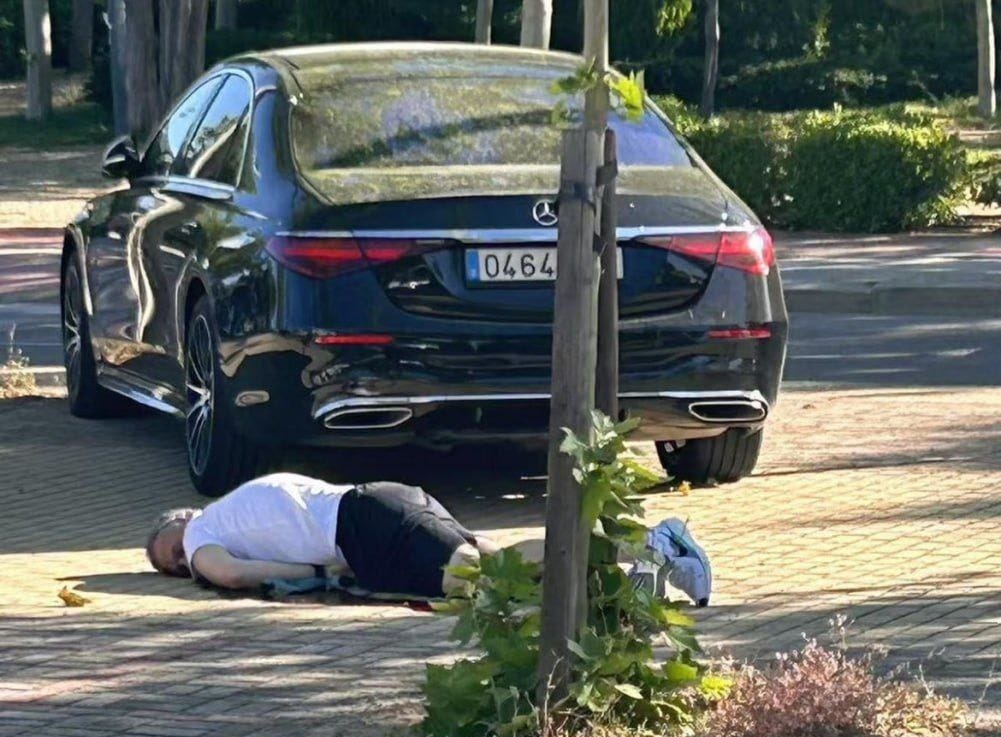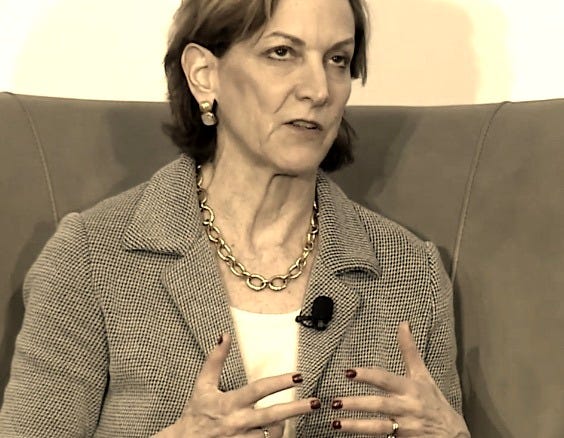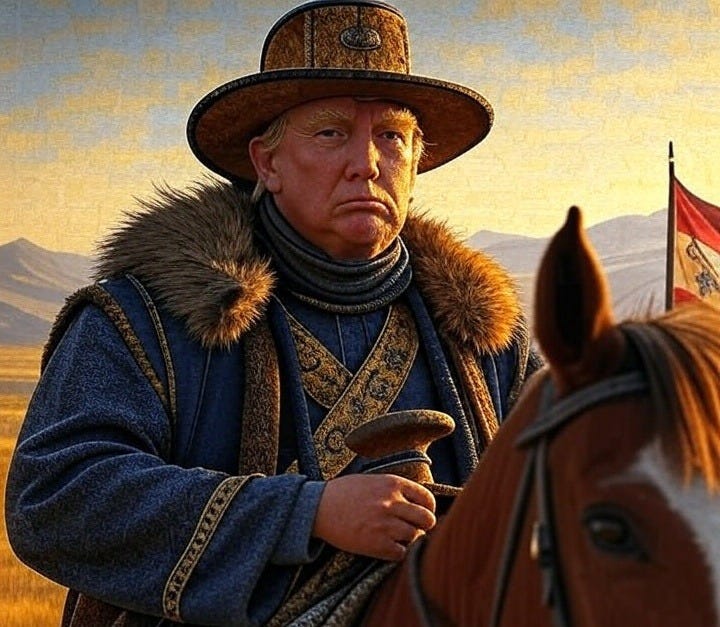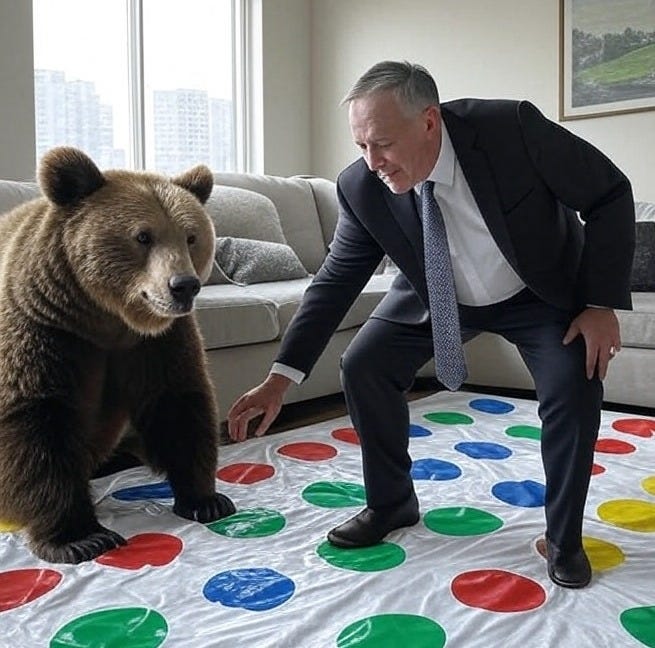USA and Russia Ready to Face Future (guest Fyodor Lukyanov)
Ukraine just had a dissident shot to death in Madrid after he dropped his kids at the American School.
In the enclosed episode of Domino Theory, Mark Simon and I discuss the future of the USA and Russia beyond Ukraine with Fyodor Lukyanov, a prominent Russian expert in international relations.
Lead-In
Christian Whiton: How can President Donald Trump put America first in regard to Russia and Ukraine?
It seems to be a question few are asking, even after this week’s phone call between Trump and Russian President Vladimir Putin.
For a lot of people in Washington opining about the Ukraine War, this question doesn’t seem to matter much. On both left and right, since the war began just over 1000 days ago, most pundits have been trying to outdo each other in sounding hawkish and calling for greater U.S. involvement rather than explaining why this situation matters to Americans—if it does.
Implausibly, they said the United States had to defend Ukraine in order to defend democracy.
For example, Mitch McConnell—until recently the top Republican in the Senate—said "Helping a democratic partner defend its sovereign territory against an unprovoked attack from a common enemy is obviously in America’s interest.”
“Obviously!” No further explanation necessary apparently.
We’ll overlook the reality that Ukraine isn’t a democracy, doesn’t respect freedom of speech or religion, tampers with American elections, and was likely responsible for the assassination of a Ukrainian dissident after he dropped of his kids at the American School in Madrid.
Imagine a government that wants to be part of NATO shooting dead one of its political opponents with his kids nearby in a NATO country. But the experts say Ukraine is a democratic ally.

Since the beginning of the war, those same experts said that ever-increasing sanctions on Russia would work, but they didn’t.
They said Putin was supported by oligarchs and that seizing their yachts would cause them to force his hand.
That didn’t work.
Then they said that a succession of U.S.-provided weapons systems like HIMARS, ATACMS, Patriot anti-missile batteries, M-1 tanks, and F-16 fighters would be radical game changers.
But they weren’t.

They said that Putin not moving his hands in an interview meant he was sick. Then they said that Putin moving his feet in an interview meant he was sick. Ukraine’s leader, Volodymyr Zelensky, said of Putin, "He will die soon, and that's a fact, and it will come to an end.”
But it hasn’t. (“Obviously!”)
We can afford Zelensky the leeway to deliver a little bit of spin. He is the president of a country that is slowly losing territory in a war of attrition with a much larger power. But the experts back here populating cable TV and other media probably ought to have a little more expertise.
They might perform better if they thought a little harder about vital American national interests.

At least McConnell and his friends in the former Biden administration imagined that real American interests were at stake. They said that China was watching and that the failure of America to practically give Ukraine a blank check would encourage China, which most Americans see as our top adversary.
My take has been that China is indeed watching, but it is more than happy to have the United States distracted by Ukraine. It isn’t impressed, it’s amused. Beijing will certainly pocket the lessons being learned on the battlefield about drone warfare, but U.S. actions in Ukraine won’t change whatever Beijing has in mind to do.
Therefore, putting America first might mean cancelling the blank check, using diplomacy to end the war, and turning over support for Ukraine to Europe which, after all, has more people than we do and nearly as large of an economy.
Putting America first also means reestablishing some sort of modus vivendi with Russia.
The Russians I’ve spoken with don’t particularly cherish dependency on China any more than Americans do. And keeping Beijing and Moscow apart ought to be a top U.S. goal.
Richard Nixon’s opening to China was largely about isolating the Soviet Union in the Cold War. Today, we should do the opposite, engaging Russia, if not to isolate China, then at least to cause some sleepless nights in Beijing.
To the dismay of Europeans and hawks in the Washington uniparty, Trump has attempted diplomacy. Both the Ukrainians and the Russians think he is asking too much and promising too little.
Leftwing Bloomberg news snidely reported the snide comments of European officials, writing that, "On a call [last] Friday, German Chancellor Friedrich Merz, France’s Emmanuel Macron and the UK’s Keir Starmer tried to make it clear to Trump that Putin has been stringing him along... They are hoping that Trump will realize that he risks looking like a loser if he forces a bad deal on Ukraine…"
Certainly these men know a lot about looking like losers. But they might consider a third option between their endless war and Washington forcing a deal on Kiev.
Earlier this week, Trump said:
I think something’s going to happen, and if it doesn’t, I just back away and they’re going to have to keep going. This is a European situation. It should have remained a European situation.
Trump famously vowed to end the Ukraine War before he even took office. He later said he was exaggerating. But ending the war was always going to be a tough job and will take more than a ceasefire and the right mixture of word salad. Recent discussion have at least apprised both the U.S. and Russian governments of each other’s interests and priorities. But as a skeptical friend observed, the Russians are playing chess and the Americans are playing twister.
Prolonged war would be an unfortunate outcome since it would prolong killing. Even if Trump does not resume Biden levels of support for Ukraine—and he won’t—it could mean continued U.S. sanctions on Russia that raise the price of energy for Americans and push Russia closer to China and Iran.
However, Trump’s statement is a recognition of the reality that putting American interests first might mean U.S. statecraft should move on from its hyper focus on Ukraine and the Biden era’s de facto Europe-first foreign policy. Who knows if Trump would then be willing to set aside the war to explore areas of cooperation with Russia, or if Moscow would even be willing to talk about much if Washington is still selling or giving arms to Ukraine and furnishing it with targeting information and other intelligence.
A peace deal would be better. But as is so often the case in wars that always seem to last longer than expected, the fighting may have to go on in Ukraine. And Trump will have to decide to what degree he wants his second term’s foreign policy to be dominated by the Ukraine War.
Podcast With Fyodor Lukyanov: Highlights
Mark and I covered a lot of ground with Fyodor and focused not just on the war, but what might happen with the USA and Russia if they move beyond Ukraine and Europe. Some excerpts follow the link to the full transcript (note: material edits for clarity).
Fyodor on whether it is possible for the United States and Russia to cooperate or at least discuss issues other than Ukraine even if the war continues, especially in light of Trump’s comment this week about backing away:
Fyodor Lukyanov: …It depends on what Trump means when he says that United States will walk away. Because walking away might mean total disengagement. “It's not my business. You guys, you might kill each other. As long as you believe it's necessary. It’s not my business. I go to other issues. I don't want to have anything to do with this war.”
If it means that this engagement includes both diplomatic and political efforts and military support to Ukraine, then to put it bluntly, Russia is fine because without American support--and this support still now is very significant when it comes to intelligence and several issues--without this support Ukraine will have a much tougher time.
And for Russia it's fine. In this case, I think for Russia it's absolutely okay to discuss whatever United States would like to discuss. Other issues, be it Middle East, be it Iran, be it Arctic economic cooperation, whatever, why not?
Mark and Fyodor explore possible areas of US-Russia discussion or cooperation:
Mark Simon: What are the areas [of possible cooperation]? Is it Islamic terrorism? Is it drugs? What are the areas that the Russians would be interested in? In other words if you came, you said, okay, you're gonna do something with this, what would the Russians bite on?
Fyodor Lukyanov: Islamic terrorism? Yes. But let us be realistic. Is it such a big issue in the international agenda just now? No, it's not. We see a lot of troubles everywhere connected to this, but it's completely different from what we had say 15, 20, 25 years ago. And I think that interaction between security services should be resumed because that's what both sides need. We know that previously—unfortunately not on the regular basis—but we remember a couple of episodes of pretty useful exchanges of information. Americans gave something to Russians and Russians gave something to Americans, which helped to discover some terror threats.
… Russia might be pretty flexible when it comes to the whole package of issues connected to Israel Palestine, Syria, Iran. All this is a conglomerate of different but interrelated topics, each of which is extremely difficult and pretty dangerous.
But I don't see a huge confrontation on this. And again, if United States will not be on the other side in Ukrainian situation—it does mean Americans need to be on the Russian side, but at least neutral or distant—then I think that the Middle East is not that high a priority for Russia that it would require to be totally, without compromise and, so to say, a struggle for interest against Americans… I think it's this negotiable and some things might be doable and we see that Trump, despite the rhetoric, which was very harsh at the beginning on Iran and many issues, but we see that in fact, he is much more flexible, actually be it on Syria, be it on Iran even, and so on.
And even with the Israeli issue, we see much more of flexibility than people expect. So again I think that's an interesting area to, to work, to discuss. The Arctic, which is interesting for Trump based on what we saw about Canada, about Greenland. And so I think, again, actually there is not such a huge discrepancy between Russia and the United States.
Christian and Fyodor discuss Europe’s divorce from Russia and the creeping failure of European integration:
Christian Whiton: Is Russia ready for a divorce from Europe and a focus elsewhere?
Fyodor Lukyanov: Russia was not at all ready or divorced with Europe. But Europe decided to divorce from Russia, and that happened overnight in 2022. That was extremely painful, and I must say unexpected on this side. I remember some speculations among people who allegedly had to do with this decision-making about the Ukrainian operation.
And the expectation was that, of course, the relationship with European Union will deteriorate sharply and very significantly for a short period because no one here, almost no one could imagine that Europe would act in such a destructive way for itself, economically devastatingly cutting economic ties, which were mostly favorable for Europe, even more favorable for Europe than for Russia.
But they, they did it for reasons which we can discuss. And that was I would say that was a shock for many people here, but that was three and a half years ago. And now willingly or unwillingly, but people got used to that. Europe is economically, culturally, and in many regards, Europe is not with us and we are not with Europe. I wouldn't say everybody's happy about that, but it's fact of life...
…Deepening and widening of [European] integration might be might be good for us, for Russia and for the United States. Now, again, for different reasons, completely different reasons, but both Americans and Russians came to the conclusion that actually it would be much more comfortable and efficient to deal with particular European countries, Germany, France, Britain, Poland, whoever, Slovakia, any, but not with the European institutions and European Union as a big institution. And I think it is a huge change. This is not because of war with Ukraine.
This is because of changing the nature of the European integration, which is now something different than it was say 25 years ago. Changing nature of Russia, changing nature of the United States, and completely changing nature of the whole international system and this new system, European Union. This integrated entity is, I would say is not an asset anymore: for us, for you, and maybe even for Europeans, it's not an asset is anymore.
Fyodor on the new order coming together:
Fyodor Lukyanov: I think we are now at some kind of turning point.
It depends on what happens in the next couple of weeks: probably if we will be able to start to walk away from this crisis. I don't mean Trump only, but Russia. Russia as well. I think that the new agenda, a completely new agenda will be needed because one of troubles with previous people, administrations, and experts was that we tried to recycle the same agenda for decades, which didn't work.
Now we need something else. And fortunately the whole world is changing, so now there’s no need to convince anybody that we need new approaches. I think everybody understands that.
Parting Shot
Congressional hearings are usually pretty boring, especially those that occur annually when agency heads defend their budget requests. But increasingly based Secretary of State Marco Rubio landed a sick burn on the insufferable pinko Maryland Senator Chris Van Hollen:
Senator Van Hollen: “I have to tell you directly and personally that I regret voting for you for Secretary of State.”
Secretary Rubio: “Your regret for voting for me confirms that I’m doing a good job.”
Excellent.
Full Episode on YouTube
Spotify
Apple Podcasts







